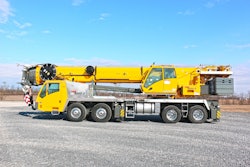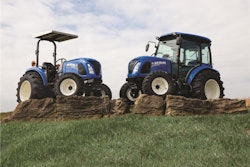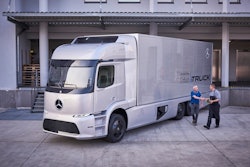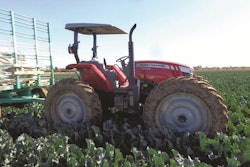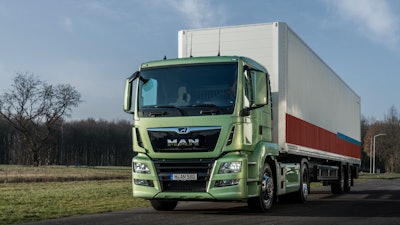
When MAN signed a letter of intent to enter into a development partnership with the Council for Sustainable Logistics (CNL) in Steyr on February 20, it also took the opportunity to present the all-electric prototype of a semitrailer tractor unit for urban distribution transport. As part of its partnership with CNL, a group of 15 of Austria's largest companies in the retail, logistics and production sectors, MAN will be making test vehicles available to nine CNL member companies for practical trials from the end of 2017.
Since 2009, MAN Truck & Bus has been working on new delivery and waste disposal vehicle concepts for urban environments. Cities and urban areas are increasingly facing the challenge of how to reconcile a healthy climate for their inhabitants and their demands for quality of life with the delivery of goods to city centres. The development of area-based and time-based traffic avoidance and modal shift concepts also comes into the equation, as do new approaches to space utilisation and new mobility concepts.
Experience from practical testing of electrically driven trucks
Against this background, MAN Truck & Bus already presented the MAN Metropolis concept vehicle back in 2012. The all-electric 26-tonne refuse collector vehicle is CO2-free and with its very low noise levels is ideal for night-shift applications in city centers. A range extender in the chassis increases its deployable range to a maximum of 150 km/day. Since then, numerous practical tests with the vehicle have provided valuable experience for future projects. The Metropolis received particularly positive feedback from the testers for its simple operation and driveability. In practice, it proved to be a versatile vehicle suitable for many different applications. Fuel savings compared with a conventional diesel-powered vehicle were around 80% with the range extender.
Further development of the tried-and-tested electric truck concept
MAN Truck & Bus presented a further development of the Metropolis concept at the IAA 2016. This time, it was a purely electrically powered semitrailer tractor for applications in night-shift deliveries to city center locations such as those normally utilized today by food supermarkets. Technically, it is based on a TGS 4X2 BLS-TS semitrailer tractor with an 18 t permissible total weight. MAN initially used a driving demonstration to present the concept study as part of their presentation of the development partnership with CNL in Steyr.
Optimized for use with uniaxial or biaxial city semitrailers, the concept vehicle fulfills the main demands being placed on future delivery vehicles for city centre applications, namely that they must have a high load volume and low unladen weight, be emission-free (CO2, NOx) and very quiet in motion, and also guarantee good maneuverability.
The MAN City-Truck concept vehicle is powered by a 250 kW electric motor which delivers its 2,700 Nm of torque to the rear axle via a propshaft, with no gearbox. Auxiliary units, such as the power steering, air compressor and the air-conditioning system, are electrically operated and controlled via the energy management system, thereby ensuring energy savings. The braking energy recovery system converts the kinetic energy of the vehicle into electrical energy during acceleration phases, and feeds it back into the battery. A display in the cockpit informs the driver about the current battery charge level. The energy for the truck is provided by high-performance lithium-ion batteries from the Volkswagen Group, which are arranged under the driver’s cab above the front axle, where standard vehicles have their diesel engine.
The additional weight of the electric drive components is compensated for by dispensing with the conventional diesel engine, with the result that the vehicle has the same payload as a similar, conventional semitrailer tractor from the TGS model range.
The batteries are normally charged overnight. At the same time, the system is also designed for so-called 'opportunity charging', i.e. interim charging while the vehicle is in use. This rapid charging method during interim stops, e.g. when the driver takes a break, or while loading and unloading the vehicle, ensures greater flexibility for operational and route planning. The concept vehicle also has the technical infrastructure to allow additional batteries to be installed on the side of the frame. With maximum battery charge, and depending on how it is used, the semitrailer combination concept vehicle can travel up to 200 km daily.
CNL practical tests as a step towards series introduction
The electric truck study, presented within the framework of the agreement with the Council for Sustainable Logistics on February 20, 2017, forms the basic technical design for the development of vehicles that will undergo practical tests in nine CNL partner companies from the end of 2017. This will involve vehicles based on the MAN TGM Series, primarily 6x2 chassis featuring refrigerated truck bodies, swap containers and drinks containers. A semitrailer combination also forms part of the scope of testing. The results from the practical tests with the test vehicles will help MAN to develop a series product portfolio of electrically driven trucks in future.
This represents just one aspect of the e-mobility strategy from MAN Truck & Bus for inner-city transport solutions, which are due to be part of the company's product range as of 2021. As part of its e-mobility roadmap, MAN is initially planning to unveil a pre-production bus version of a battery-electric vehicle (BEV) to the public by 2018. Series production of a 100% electrically powered city bus is due to start at the end of 2019. The technological know-how about the e-mobility assembly that has been gained in respect of buses will also be available for use in the eTruck. Regarding eTrucks, the first small-series production is due to start at the Steyr site at the end of 2018, following on from the practical tests by CNL companies that will be starting at the end of 2017. Series production of eTrucks will start in early 2021.
When it comes to its e-mobility strategy, membership of the Volkswagen Group means that MAN is able to utilize synergies within the group and profit from the dynamics of the passenger car sector.




